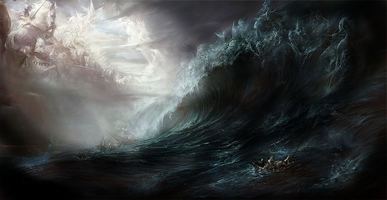
Rambling On is a seriously fun blog and podcast covering sports, music, culture, and more. Check us out on Reddit, Twitter, Facebook, or at our website.
He who purifies himself in the river of a subdued spirit, the waters of which are truth, its waves compassion, and its shores excellent temper and conduct, will be liberated from this world; but liberation cannot be obtained by just outward observances.
-Ancient Indian proverb
There is a lot of wisdom in this short, beautiful, practical proverb. It is insightful for anyone who desires to be the best version of themselves.
Having a “subdued spirit” is an underrated concept. It's difficult to subdue the wildness of the self, it takes hard work and the difficult virtue of self-control. It's easier to be forceful, prideful, and self-absorbed. Hence the need for purification.
The proverb says that we purify ourselves in the water of truth. But what is truth? Is it relative to each person's views? Or is there absolute truth? A dramatic scene during Jesus' trial before Pontius Pilate cryptically touches on the subject:
Pilate therefore said unto him, Art thou a king then?
Jesus answered, Thou sayest that I am a king. To this end was I born, and for this cause came I into the world, that I should bear witness unto the truth. Every one that is of the truth heareth my voice.
Pilate saith unto him, What is truth?
(John 18: 37-8a)
It's a chilling exchange with no resolution. As Sir Francis Bacon cleverly says in his essay On Truth:
What is truth? said jesting Pilate, and would not stay for an answer.
To Pilate's credit it's tough to stay for the answer, especially if you follow the Christian tradition. Jesus' truth is life's highest calling: love God and love one another, even unto death. Take up your cross and die daily to yourself and what holds you back. As the great 20th century author and philosopher G.K. Chesterton said, “The Christian ideal has not been tried and found wanting; it has been found difficult and left untried.” Easy Christianity is fake Christianity.
Jesus and the ancient Indian proverb promote different visions of what the truth is (though there is a good bit of overlapping). They both agree, at the very least, that absolute truth is real and attainable. This goes against our post-enlightenment culture which claims that one person's belief is as good as any other. It seems like a fine, inclusive view, one that promotes tolerance and coexistence.
However, if one person's truth is as good as that of anyone else, is there a difference between Mother Theresa and Hitler? The relativist is forced to believe that they each had their own equally “right” version of the truth, which is obviously terrifying.
Even more definitively, “there is no absolute truth” is itself an absolute truth, so the argument collapses on itself philosophically.
Ultimately, each of us has to answer the important question of what truth is. We all have doubts, as jesting Pilate did, but there are answers in the faith of Jesus and the rivers of Eastern wisdom.

The waves of the purifying waters are the difficult virtue of compassion. Is it easier to condemn those you disagree with, and your enemies, or to have compassion on them? Once again, it takes hard mental and emotional work to have compassion, work that we are often too lazy to do. Yet the more you focus on having compassion, especially for your enemies, the happier you'll be mentally. It's all part of subduing the mind. Only after it is subdued can there be any room for peace, which is why so few people have peace of mind today.
The shores of the river are excellent temper and conduct. It's so easy to lose our temper. My mind immediately goes to driving: although I am not close to perfect, I tend to get angry at the slightest thing another driver does wrong. Even if I was a perfect driver, losing my temper does nothing but add unnecessary negativity to my life, which causes both mental and physical anguish. If I see the other as a brother or sister it becomes harder to lose my temper at them.
This is connected to the Christian concept of grace. Christians aren't called to love based on merit, but simply because each person is our brother and sister. God loves us for who we are, and as such we should do the same for those around us. When I lose my temper at another driver my heart rate goes up, I get angry, and I feel terrible. When I smile and laugh it off I always feel better about myself and the situation. This extends to any other time in my life when I can either get angry or stay calm.
“Excellent conduct” is somewhat relative to cultural and personal standards. In some cultures you're expected to take your shoes off upon entering a person's house; in others it's weird or gross. Regardless, there are plenty of things that fall into this category across cultures: treating people well, not lying, being presentable, being respectful, and others. Cultures can differ on those things too, but there are parameters that are set both intrinsically and by our surroundings. Following your conscience is a good starting point but it can't end there – I'm sure Hitler followed his conscience, or at least fit his conscience to his hatred.
It's all a lot simpler than a convoluted explanation: be compassionate, control your anger, and be a good person.

The proverb promises us that we'll be liberated from the world if we search for truth, practice compassion, control our temper, and have excellent conduct. This is an interesting point of both similarity and dissimilarity to the Christian tradition.
By Eastern standards a person practices virtues, like compassion and good temper, in order to escape the world itself because it is evil. Jesus spends a lot of time condemning those of “this world” throughout the Gospels but he does not have that dualistic hatred of the physical world itself. The point of his Incarnation, the concept of God becoming human, is that humanity and the material world are good and are worth saving. Although he had problems with the system, Jesus was a faithful Jew of his time, and as such believed the Jewish philosophical claim that the physical world was “very good” because God created it. This is in sharp contrast with dualistic Eastern traditions which claim that the spirit is good and the world is bad.
There is a similarity between the two views, though. Jesus called Satan “the prince of this world” in the context of those who are weighed down by detrimental worldly things: lust, pride, power, and other temporary fixes that do not satisfy. Indian philosophy warns of these things as well. The difference is that Christianity sees it as a sickness in an otherwise good world, while Eastern thought claims that it is proof that the world is bad and must be transcended.
On authenticity
The last point of the proverb is something unequivocally similar with the teachings of Jesus: that outward appearances can't make up for what is lacking on the inside. As Jesus says:
Woe to you, scribes and Pharisees, hypocrites! For you cleanse the outside of the cup and of the plate, but inside they are full of extortion and rapacity. You blind Pharisee! First cleanse the inside of the cup and of the plate, that the outside also may be clean.
Woe to you, scribes and Pharisees, hypocrites! For you are like whitewashed tombs, which outwardly appear beautiful, but within they are full of dead men's bones and all uncleanness. So you also outwardly appear righteous to men, but within you are full of hypocrisy and iniquity.
(Matt. 23:25-28, RSV)
The point of Jesus' harsh, somewhat cryptic words are the same as that of the proverb: “liberation cannot be obtained by just outward observances.” You can fool other people, you can even fool yourself, but you can't fool God. Who you are matters. Intention matters. Why you do what you do matters.
Gather at the river and throw yourself in
Ultimately, cleansing in the purifying river of this proverb means desiring to be the best version of yourself. It means searching earnestly for the truth, being compassionate, keeping anger in check, and doing what is right. We each have to make the journey ourselves, but wisdom from the greatest minds that have already made the journey, such as the people who created proverbs like this one, are an excellent guide.
Erik Ritland is a writer and musician from St. Paul, Minnesota. His blog and podcast Rambling On features commentary on music, sports, culture, and more. He was also Lead Staff Writer for Minnesota culture blog Curious North. Support Erik's music via his Patreon account, reach him via email, or find him on Facebook and Twitter
 RSS Feed
RSS Feed
